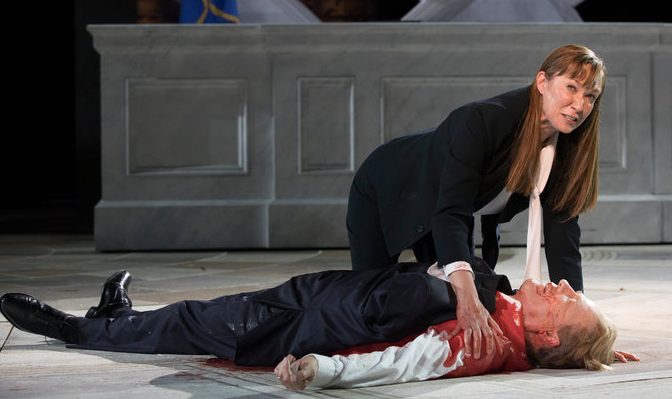From May 23rd to June 18th, at the Delacorte Theater in Central Park, President Donald Trump was assassinated on stage by a group of conspiring political opponents. Or rather actor Gregg Henry, playing a blond-haired, hand-gesturing populist with a slinky Slovenian wife on his arm, is stabbed on his way to the Roman Senate. Of course, he isn’t really Trump, but the parallel is overt.
The occasion is the Public’s production of Shakespeare’s Julius Caesar, staged as part of the Shakespeare in the Park series, in Trump’s hometown, New York City.It is not the first portrayal of Julius Caesar to feature a modern world leader as the emperor; in 2012, the Guthrie theater staged a production of Julius Caesar that condemned an Obama-like Caesar to the same violent fate. Unlike The Public’s production, however, the theatrical death of a Roman Obama provoked no backlash.
For outlets on the right, the assassination of Trump-as-Caesar is, at its best, a glorification of political violence, and at its worst, an invitation for violence against an American president. Breitbart, for example, published an article with the headline:“’Trump’ Stabbed to Death in Central Park Performance of ‘Julius Caesar.’”
The controversy was not limited to right-wing websites, however. Delta and Bank of America withdrew their sponsorship of the Public Theater and of the production. In public statements, the companies opposed the play on the grounds that it incited violence and was unsettlingly graphic. But even as the (media-fueled) reaction spreads, and some jaws drop in horror, the artistic director of the Public Theater, Oskar Eustis, remains resolute.
Eustis offers a rationale for featuring modern leaders in the play. He views Julius Caesar not as a call to arms but as a cautionary tale whose roots are 400 years but whose message is consistently relevant.In a public statement, he wrote, “Our production of ‘Julius Caesar’ in no way advocates violence towards anyone. Shakespeare’s play, and our production, make the opposite point: those who attempt to defend democracy by undemocratic means pay a terrible price and destroy the very thing they are fighting to save.”
Readers of Julius Caesar have always grappled with the age-worn question of whether a tyrant killed is a democracy redeemed. In this respect, the specifics of The Public’s production don’t matter much. The crowds of the Roman Forum might be yelling “Make America Great Again” or be wearing the requisite white toga, but ultimately Caesar – and the Roman Republic – will fall.David Scott Kastan, the George M. Bodman Professor of English and Shakespeare scholar at Yale, shared his thoughts on the controversy. with The Politic in a written correspondence Of the accusations that the new production advocates violence, Kastan wrote, “Is it a plausible interpretation? Sure. Is it an inevitable interpretation? Of course not.”
He went on to explain, that the play “is obviously a play about how leaders achieve their power and authority. Brutus and Caesar divide the play and oddly mirror each other. Caesar is arrogant and narcissistic—and charismatic in public, though personally flawed. Brutus is well-intentioned and idealistic—and self-admiring and self-deceived, convinced of his own moral superiority. So, it is a play for our times, but, then again, it is, on these very grounds, a play for all times.”
Kastan suggested that the play’s seeming departure from the artistic sphere into the political is not actually a departure at all. “Shakespeare’s plays were always obviously political, or at least could be so conceived.”
“In 1600, supporters of a charismatic nobleman, who was planning a rebellion against Queen Elizabeth, paid Shakespeare’s company to put on a public performance of Richard II, knowing that it was a play about a charismatic nobleman rebelling (successfully) against a legitimate monarch. Kastan recounted how in 1600, a charismatic nobleman was planning a rebellion against Queen Elizabeth. His supporters paid Shakespeare’s company to put on a public performance of Richard II, knowing it was a play about a charismatic nobleman’s successful rebellion against a monarch. He added that “Elizabeth, at another time, was reported to have said: ‘I am Richard II; know ye not that.’ But she didn’t tweet it,” he said.
“Of course they would choose Trump. How could you not?” Susan Paine, a member of the Public Theater who attended the production of Julius Caesar this week, told The Politic that she sees the play not as a corruption of Shakespeare’s tragedy, but rather as a testament to its continuing relevance.
Sarah O’Hagan, another member who was also in the audience, agreed, drawing upon the fact that the Trump-as-Caesar adaptation remains faithful to “the long tradition in the uses of the play; it has been put to that use in almost every political era.”
In an interview with The Politic, O’Hagan said, “the play itself is in no way about Donald Trump. It’s about democracy, and when the public compact is broken, and the risks of violence.”
The scandal surrounding Julius Caesar has only grown in recent days as an act of political violence made news in the U.S. In Virginia, shooter James T. Hodgkinson opened gunfire during a Republicans’early-morning baseball practice, hospitalizing Steven Scalise, the House majority whip, and at least six other people. The nature of the tragedy has only made calls condemning The Public, and its portrayal of political violence, more resonant.
For now, however, questions about the real-life implications of staged assassinations have only made director Eustis more resolute. In a note sent out to members of The Public, he affirmed: “such discussion is exactly the goal of our civically-engaged theater; this discourse is the basis of a healthy democracy.”

